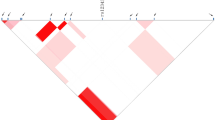Abstract
Background
Large artery disease (LAD), cardioembolism (CE), and small vessel disease (SVD) are well-established causes of ischemic stroke. Although a founder variant of RNF213 has been regarded a genetic susceptibility for Moyamoya disease (MMD) and certain types of intracranial atherosclerotic stenosis (ICAS), correlations between RNF213 variants and ischemic stroke with SVD remain largely unknown.
Objectives
This study aimed to characterize the associations of four RNF213 polymorphisms (4448G>A, 4810G>A, 4863G>A, and 4950G>A) with ischemic stroke subtypes in Koreans.
Methods
Genetic data from 529 stroke patients were analyzed and compared to 424 age- and sex-matched controls. Genetic variants of RNF213, as obtained from the Human Gene Mutation Database, were analyzed in the study subjects using the polymerase chain reaction restriction fragment length polymorphism assay. We investigated four single-nucleotide polymorphisms of RNF213 to elucidate their association with ischemic stroke [LAD, (n = 192), SVD (n = 145) and CE (n = 51)].
Results
The RNF213 4950G>A genotype was observed more frequently in cerebral stroke patients and was more strongly associated with SVD than LAD (P = 0.014). RNF213 4448/4950 in combination with G–A was higher in SVD patients. However, the RNF213 4863/4950 allele combination was associated with increased risk of SVD and LAD. These results confirmed that RNF213 4950GA+AA variants were more frequent in ischemic stroke, especially in SVD, and that RNF213 G–G–G–A and G–G–G–A (4448/4810/4863/4950) haplotype sequences play a role in LAD and CE as well as SVD.
Conclusions
Our data reported that the RNF213 4950G>A genotypes and several RNF213 (4448/4810/4863/4950) haplotypes were associated with ischemic stroke in Koreans.
Similar content being viewed by others
References
Adams HP Jr, Bendixen BH, Kappelle LJ, Biller J, Love BB, Gordon DL, Marsh EE III (1993) Classification of subtype of acute ischemic stroke. Definitions for use in a multicenter clinical trial. TOAST. Trial of Org 10172 in Acute Stroke Treatment. Stroke 24:35–41
Alamowitch S, Plaisier E, Favrole P, Prost C, Chen Z, Van Agtmael T, Marro B, Ronco P (2009) Cerebrovascular disease related to COL4A1 mutations in HANAC syndrome. Neurology 73:1873–1882
Baba T, Houkin K, Kuroda S (2008) Novel epidemiological features of moyamoya disease. J Neurol Neurosurg Psychiatry 79:900–904
Bang OY, Ryoo S, Kim SJ, Yoon CH, Cha J, Yeon JY, Kim GM, Chung CS, Lee KH et al (2015) Adult Moyamoya disease: a burden of intracranial stenosis in East Asians? PLoS One 10:e0130663
Caplan LR, Gorelick PB, Hier DB (1986) Race, sex and occlusive cerebrovascular disease: a review. Stroke 17:648–655
Cecchi AC, Guo D, Ren Z, Flynn K, Santos-Cortez RL, Leal SM, Wang GT, Regalado ES, Steinberg GK, Shendure J et al (2014) RNF213 rare variants in an ethnically diverse population with Moyamoya disease. Stroke 45:3200–3207
Conklin J, Silver FL, Mikulis DJ, Mandell DM (2014) Are acute infarcts the cause of leukoaraiosis? Brain mapping for 16 consecutive weeks. Ann Neurol 76:899–904
Fujimura M, Sonobe S, Nishijima Y, Niizuma K, Sakata H, Kure S, Tominaga T (2014) Genetics and biomarkers of Moyamoya disease: significance of RNF213 as a susceptibility gene. J Stroke 16:65–72
Joutel A, Corpechot C, Ducros A, Vahedi K, Chabriat H, Mouton P, Alamowitch S, Domenga V, Cecillion M, Marechal E et al (1996) Notch3 mutations in CADASIL, a hereditary adult-onset condition causing stroke and dementia. Nature 383:707–710
Kamada F, Aoki Y, Narisawa A, Abe Y, Komatsuzaki S, Kikuchi A, Kanno J, Niihori T, Ono M, Ishii N et al (2011) A genome-wide association study identifies RNF213 as the first Moyamoya disease gene. J Hum Genet 56:34–40
Kim JS, Kim YJ, Ahn SH, Kim BJ (2018) Location of cerebral atherosclerosis: why is there a difference between east and west? Int J Stroke 13:35–46
Kint JA (1970) Fabry’s disease: alphA–Galactosidase deficiency. Science 167:1268–1269
Kubo M, Hata J, Ninomiya T, Matsuda K, Yonemoto K, Nakano T, Matsushita T, Yamazaki K, Ohnishi Y, Saito S et al (2007) A nonsynonymous SNP in PRKCH (protein kinase C eta) increases the risk of cerebral infarction. Nat Genet 39:212–217
Liu W, Morito D, Takashima S, Mineharu Y, Kobayashi H, Hitomi T, Hashikata H, Matsuura N, Yamazaki S, Toyoda A et al (2011) Identification of RNF213 as a susceptibility gene for Moyamoya disease and its possible role in vascular development. PLoS One 6:e22542
Miyawaki S, Imai H, Takayanagi S, Mukasa A, Nakatomi H, Saito N (2012) Identification of a genetic variant common to moyamoya disease and intracranial major artery stenosis/occlusion. Stroke 43:3371–3374
Miyawaki S, Imai H, Shimizu M, Yagi S, Ono H, Mukasa A, Nakatomi H, Shimizu T, Saito N (2013) Genetic variant RNF213c.14576G>A in various phenotypes of intracranial major artery stenosis/occlusion. Stroke 44:2894–2897
Pantoni L (2010) Cerebral small vessel disease: from pathogenesis and clinical characteristics to therapeutic challenges. Lancet Neurol 9:689–701
Richards A, van den Maagdenberg AM, Jen JC, Kavanagh D, Bertram P, Spitzer D, Liszewski MK, Barilla-Labarca ML, Terwindt GM, Kasai Y et al (2007) C-terminal truncations in human 3′–5′ DNA exonuclease TREX1 cause autosomal dominant retinal vasculopathy with cerebral leukodystrophy. Nat Genet 39:1068–1070
Sacco S, Marini C, Totaro R, Russo T, Cerone D, Carolei A (2006) A population-based study of the incidence and prognosis of lacunar stroke. Neurology 66:1335–1338
Tsai CF, Thomas B, Sudlow CL (2013) Epidemiology of stroke and its subtypes in Chinese vs white populations: a systematic review. Neurology 81:264–272
White H, Boden-Albala B, Wang C, Elkind MS, Rundek T, Wright CB, Sacco RL (2005) Ischemic stroke subtype incidence among whites, blacks, and Hispanics: the Northern Manhattan Study. Circulation 111:1327–1331
Yanagawa S, Ito N, Arima K, Ikeda S (2002) Cerebral autosomal recessive arteriopathy with subcortical infarcts and leukoencephalopathy. Neurology 58:817–820
Zhang Z, Xu G, Liu D, Fan X, Zhu W, Liu X (2012) Angiotensin-converting enzyme insertion/deletion polymorphism contributes to ischemic stroke risk: a metA–Analysis of 50 case–control studies. PLoS One 7:e46495
Acknowledgements
This study was supported by Grants from the National Research Foundation of Korea (NRF) funded by the Ministry of Education, Science and Technology (NRF-2016R1D1A1B03930141, NRF-2017R1D1A1B03030110 and NRF-2018R1D1A1A09082764).
Author information
Authors and Affiliations
Corresponding authors
Ethics declarations
Conflict of interest
Young Seok Park, Hyeon Woo Park, Han Sung Park, Chang Soo Ryu, Jeong Yong Lee, Eun Ju Ko, Jung Hoon Sung, Jinkwon Kim, Ok Joon Kim, Nam Keun Kim declare that they have no conflict of interest.
Ethical approval
This study had been approved by the Institutional Review Board of CHA Bundang Medical Center (IRB number: BD2010-123D) and written informed consent was provided by all patients.
Additional information
Publisher's Note
Springer Nature remains neutral with regard to jurisdictional claims in published maps and institutional affiliations.
Supplementary Information
Below is the link to the electronic supplementary material.
Rights and permissions
About this article
Cite this article
Park, Y.S., Park, H.W., Park, H.S. et al. Association of genetic variants of RNF213 with ischemic stroke risk in Koreans. Genes Genom 43, 389–397 (2021). https://doi.org/10.1007/s13258-020-01022-7
Received:
Accepted:
Published:
Issue Date:
DOI: https://doi.org/10.1007/s13258-020-01022-7




